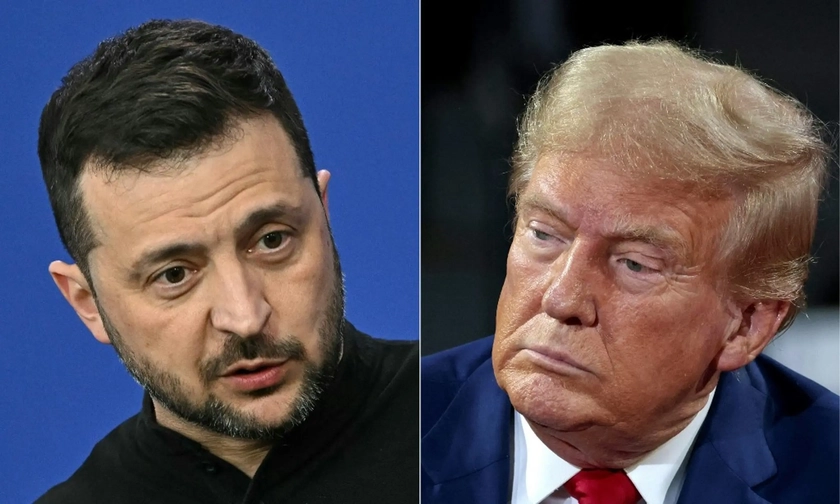As discussions on Ukraine’s future intensify, one recurring notion in diplomatic circles is that Donald Trump has set his sights on a Nobel Peace Prize by negotiating an end to the war. However, if he mishandles this delicate process, that prize will remain far beyond his reach. If his proposed deal leaves Ukraine vulnerable, fractures NATO, or emboldens further Russian aggression, his legacy will not be peace – it will be appeasement.
As my recent polling found, while most Ukrainians believe Trump’s election will mean a swifter end to the war, many also fear this will be on terms less favorable to Ukraine. The recent remarks by US Secretary of Defense Pete Hegseth do not inspire confidence. He stated unequivocally that a return to Ukraine’s pre-2014 borders is off the table. Does this mean the United States is prepared to disregard the Belovezh Accords of 1991, which affirmed Ukraine’s sovereignty within internationally recognized borders?
JOIN US ON TELEGRAM
Follow our coverage of the war on the @Kyivpost_official.
More troublingly, it would mark yet another broken American commitment to Ukraine – following the Budapest Memorandum of 1994, which assured Ukraine’s security in exchange for surrendering the world’s second-largest nuclear arsenal. A failure to uphold these agreements sends a disastrous signal, not just to Russia but to potential aggressors worldwide.
Ukrainian President Volodymyr Zelensky has made it clear that no deal will be accepted without Ukraine’s involvement. He has also implied that the US can no longer be fully trusted to align with European interests in the region. Gen. Keith Kellogg, Trump’s top security envoy, recently echoed the necessity of Ukraine’s presence at the negotiating table – but was noticeably vague about European involvement. Excluding Europe from a settlement on European security would be a serious and costly mistake.

Zelensky Holds Talks With World Leaders on Security, Military Aid, Just Peace
If a peace deal is to have any legitimacy, it must satisfy several key conditions.
The only real assurance of lasting peace for Ukraine is NATO membership.
First, it cannot leave Ukraine as an exposed buffer state, vulnerable to another Russian invasion in the coming years. A ceasefire that merely freezes the conflict without robust security guarantees would be a repeat of the failed Minsk agreements of 2014 and 2015, which Moscow systematically violated. The only real assurance of lasting peace for Ukraine is NATO membership. Anything short of that leaves the door open for further Russian aggression.
Secondly, any peace deal must consider the reality on the ground. Russia’s economy, despite Western sanctions, has been kept afloat by its ability to bypass restrictions – particularly through the sale of oil to India and other third parties. If Trump is serious about exerting pressure on Moscow, he must address these loopholes rather than force Ukraine into an unfavorable settlement. He must also understand that the very survival of Ukraine as a sovereign state depends on continued military and economic support.
Meanwhile, as these negotiations develop, Europe must step up. The continent has long relied on American military backing, but with Washington potentially shifting its stance, European nations must take responsibility for their own security. Trump has already made it clear that he expects Europe to contribute more to defense, and rightly so. Poland has led by example, committing 5% of its GDP to defense, while the Baltic states are set to reach this benchmark by next year. But others, including key Western European powers, have lagged behind. If Europe wants a real say in shaping Ukraine’s future and ensuring long-term stability on the continent, it must match its words with action.
The recent Munich Security Conference reflected these tensions. While European leaders expressed continued support for Ukraine, the reality is that decisive commitments on increased defense spending and military aid remain insufficient. In the meantime, senior figures from the Trump administration are reportedly in Saudi Arabia to engage in talks with Russian and Ukrainian negotiators. National Security Advisor Mike Waltz, Secretary of State Marco Rubio, and Middle East envoy Steve Witkoff are expected to push for an agreement in the coming days.
We must reject the notion that a rushed, ill-conceived deal is the only path forward.
Zelensky, however, remains deeply skeptical of Putin’s intentions, and for good reason. Russia has shown time and again that it does not honor ceasefires or diplomatic agreements. The OSCE monitoring missions that oversaw previous ceasefire lines were ignored and rendered powerless in the face of Russian violations. So, the critical question remains: who will enforce any new ceasefire? Will there be peacekeeping troops on the ground? If so, which nations would be willing to send them? And what happens if – when – Russia violates the terms again?
These are fundamental concerns that must be addressed before any deal is signed. A flawed agreement that fails to ensure Ukraine’s security could lead to an internal crisis, possibly even civil unrest. The thousands of battle-hardened Ukrainian soldiers who have sacrificed so much will not accept a settlement that undermines their cause. Any agreement that leaves Russia with the capacity to strike again, or forces Ukraine into concessions that betray its sovereignty, will not bring peace—it will simply set the stage for the next war.
The stakes could not be higher. We must reject the notion that a rushed, ill-conceived deal is the only path forward. A just peace must be one that guarantees Ukraine’s long-term security, holds Russia accountable, and reinforces the strength of Western alliances. Anything less would be a betrayal of everything Ukraine has fought for – and would all but guarantee that history repeats itself.
Lord Ashcroft KCMG PC is an international businessman, philanthropist, author and pollster. For more information on his work, visit lordashcroft.com. Follow him on X/Facebook @LordAshcroft.
The views expressed in this opinion article are the author’s and not necessarily those of Kyiv Post.
You can also highlight the text and press Ctrl + Enter











